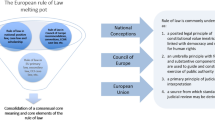Abstract
The legal framework of telecommunications regulation is about to change. This is due to the reform package which the Commission submitted in November 2007. The European Parliament and the Council of Ministers are still to approve. There is ongoing political debate. Unfortunately, it does not cover the crucial issue: is the sector-specific ex ante telecommunications regulation still justified after ten years of liberalisation and a partly dramatic evolution towards competition? The author replies in the negative from a historical, a regulatory policy and an analytical perspective. De lege lata, the three-criteria test, if applied correctly, induces this outcome. De lege ferenda, a sunset rule, if need be a qualified one, would be useful.
Similar content being viewed by others
References
See Monopolkommission, ‘Wettbewerbsentwicklung bei der Telekommunikation 2007: Wendepunkt der Regulierung’, Sondergutachten 50 (Baden-Baden, Nomos 2008), at p. 67 et seq.
Cf., Bundestag printed paper 13/3609 (1996), Begründung des Gesetzesentwurfs, at pp. 1/2 and 33/34; see also Bundestag printed paper 15/2316 (2004), Entwurf eines Telekommunikationsgesetzes, at p. 55, under A.3; see also the omnibus volume A. Picot, ed., 10 Jahre Wettbewerbsorientierte Regulierung von Netzindustrien in Deutschland. Bestandsaufnahme und Perspektiven der Regulierung (Munich, C.H. Beck 2008).
Bundestag printed paper 13/3609, supra n. 2, at p. 37 left col. (re. § 2, para. 3 bill).
Bundestag printed paper 15/2316, supra n. 2, at p. 57 right col. (re. § 3 No. 10 government bill).
Bundestag printed paper 13/9720 (1998), Entwurf eines Sechsten Gesetzes zur Änderung des Gesetzes gegen Wettbewerbsbeschränkungen, at p. 37 (re. I. Allgemeines, 3. Grundzüge des Entwurfs c) ff )).
Federal Ministry of Economics, Perspektiven der Regulierung der europäischen Kommunikationsmärkte (December 2005), at pp. 2, 4 and 5.
Printed in Zentralverband Elektrotechnik und Elektroindustrie e.V., Circular FJ 8/98 Annex 1; regarding the issue as a whole, see Möschel, ‘Der 3-Kriterien-Test in der Telekommunikation’, MultiMedia und Recht (MMR) (2007) p. 343 et seq.
Commission Recommendation of 11 February 2003 on relevant product and service markets within the electronic communications sector susceptible to ex ante regulation in accordance with Directive 2002/21/EC of the European Parliament and of the Council on a common regulatory framework for electronic communication networks and services, OJ 2003 L 114 of 8 May 2003, at pp. 45–49.
Directive 2002/21/EC of the European Parliament and of the Council of 7 March 2002 on a common regulatory framework for electronic communications networks and services (Framework Directive), OJ 2002 L 108 of 24 April 2002, at pp. 33–50.
Draft Report on the proposal for a directive of the European Parliament and of the Council amending Directive 2002/21/EC on a common regulatory framework for electronic communications networks and services, Directive 2002/19/EC on access to, and interconnection of, electronic communications networks and services, and Directive 2002/20/EC on the authorisation of electronic communications networks and services, Explanatory Statement under 3 (Transition towards Full Competition), dated 16 April 2008 (2007/0247(COD)).
Cf., J. Masing, ‘Soll das Recht der Regulierungsverwaltung übergreifend geregelt werden?’, Verhandlungen des 66. Deutschen Juristentages 2006, Vol. I, Gutachten D (Munich, C.H. Beck 2006).
Regarding the issue as a whole, see H. Schedl and A. Kuhlmann, ‘Sektorspezifische Regulierung: Transitorisch oder ad infinitum? Eine internationale Bestandsaufnahme von Regulierungsinstitutionen’, 40 ifo Forschungsbericht (Munich 2008).
Regulation No 717/2007 of the European Parliament and of the Council of 27 June 2007 on roaming on public mobile telephone networks within the Community and amending Directive 2002/21/EC, OJ L 171 of 27 June 2007, at pp. 32–40.
See W. Möschel, ‘Fehlsame Weichenstellung in der TK-Regulierung’, MMR (2007) p. 547 et seq.
Cf., Federal Administrative Court Decision of 28 November 2007 (6 C 42/06), margin number 28 et seq.
Supra n. 6, at p. 1.
Cf., W. Möschel, ‘Investitionsfreiheit ist ein hohes Gut’, Festschrift für Otto Graf Lambsdorff zum 80. Geburtstag [Publication in honour of Otto Graf Lambsdorff] (Stuttgart 2007), at p. 127 et seq.
According to G. Knieps, ‘Sektorspezifische Regulierung: Transitorisch oder ad infinitum?’, 21 ifo Schnelldienst (2007) p. 7, at p. 9.
OECD, Communications Outlook (2007), at p. 127, ISBN: 978-92-64-00704-8, http://www.oecd.org/document/17/0,3343,de_2649_201185_38876369_1_1_1_1,00.html.
L. Waverman, et al., Access Regulation and Infrastructure Investment in the Telecommunications Sector: An Empirical Investigation (London and Brussels 2007).
‘According to a simulation based on operators in our sample, the introduction of regulated access to incumbents’ networks costs Europe a lost investment in the amount of 25.1% of the entrants’ infrastructure stock in the first year. This loss accumulates over time and reaches 111.5%, which is equivalent to €18.1 billion, over 5 years. In other words, our results suggest that the entrants would more than double their infrastructure over 5 years had they no regulated access to the incumbents’ local loops. In terms of the total telecommunication investment in Europe, the lost investment is equivalent to 8.4%, which is a significant amount.’; H.W. Friederiszick, M. Grajek and L.H. Röller, ‘Analysing the Relationship between Regulation and Investment in the Telecommunication Sector’, ESMT Competition Analysis (28 November 2007), at p. viii, http://www.esmt.org/en/114288.
For details, see Möschel, supra n. 7, p. 343, at p. 344.
Re the following and Möschel, supra n. 7, at pp. 343, 345 et seq.
See, e. g., Knieps, supra n. 18, at p. 7.
See Federal Cartel Office (Liberty/VIOLA) Decision of 22 February 2007, WuW/E DEV 558, and Federal Cartel Office (KDG/Kabel BW etc) press release of 24 August 2004.
Judicial release of 3 April 2008, WuW/E DE-V 1567 (Kabel Deutschland).
See I. Vogelsang, ‘Regulierungsbedürftigkeit und Deregulierung’, 21 ifo Schnelldienst (2007) p. 10, at p. 11 et seq.
For details and supporting evidence, see Möschel, supra n. 7, at p. 343 et seq.
Cf., supra n. 10.
For general information on the Commission’s reform proposals, see in particular Monopolkommission, supra n. 1, at p. 82 et seq.
Author information
Authors and Affiliations
Rights and permissions
About this article
Cite this article
Möschel, W. The Future Regulatory Framework for Telecommunications: General Competition Law instead of Sector-Specific Regulation — A German Perspective. Eur Bus Org Law Rev 10, 149–163 (2009). https://doi.org/10.1017/S1566752909001499
Published:
Issue Date:
DOI: https://doi.org/10.1017/S1566752909001499



